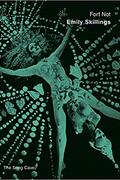
In her highly anticipated debut collection, Fort Not, Emily Skillings creates an “atmosphere for encounter,” akin to searching for meaning through lip-reading. We soon realize that these poems are speaking to us in tones that appear elegantly improvisational. And while the poems may “shout from the periphery,” it is not without reason, but because of their desire to direct the reader to a created space—a world that allows for “curved logic,” “that dirty, off-gold color,” “middle-class nausea,” and “metallic power” to coexist. The mysteries here embrace a natural, physical music, pulling us into a moving current of painted images, poetic histories, and draped bodies evaporating to reveal others behind them, as quickly as they appear.
“Although her language sometimes suggests she is from another planet, Emily Skillings knows how history happens on ours: “There was a history there of men overtaking and rebuilding and casting to ruin, then drawing up new plans, beginning anew, hesitating, revising only to tear down and build again, and always slightly off-center.” This is about as normal as things get in this staggeringly beautiful, wildly off-kilter account of daily life, or in Auden’s words, “A way of happening, a mouth.” Whatever. Fort Not is a savagely brilliant debut.” —John Ashbery
“Emily Skillings’ beauteous first book is an instruction manual on how to live your life. What is a book when it’s a blush? A dropdown etiquette c/o flowers and a way to teach yourself: how to backchannel your garden, how to be a matron of no, how to wipe your dirt on other people, how to talk nice to the Holland Tunnel, how to shake in Carpet Town, how to make your sinuses more operatic, how to surrender a glacier. With each lesson, Fort Not brushes back our inhibitions and dismantles our intentions.” —Tan Lin
“Emily Skillings throws you a lot of curves and I like that. Her poems are actually pretty dense and then suddenly she shifts (knowingly) into a radiant simplicity. I love her trembling, and though she asks “is trembling/always bad?” it’s clear she knows it’s not. Emily’s just trying to make us watch better. I love this poet’s compulsive sense of risk, her sense of humor. I love her dread. I love her love of detail. Her revulsion. So finally, basing this opinion on my exploration of this one writer, I’ll say that bitches are smart. Emily Skillings is very special. I’ll keep reading her.” —Eileen Myles